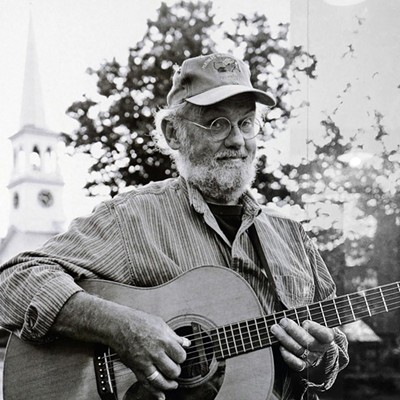
- File: Kevin McCallum ©️ Seven Days
- Gov. Phil Scott
Gov. Phil Scott vetoed two more key pieces of legislation on Thursday, bringing the total to eight so far this session.
Scott is seeking to block data privacy legislation and a bill to reform Act 250 and promote housing, arguing that both are flawed. The new vetoes up the stakes for the override session of the legislature scheduled to start on June 17.
Democratic lawmakers have the numbers to theoretically override any veto if they stick together, but absences and political differences can create challenges. Two-thirds of those present and voting in each chamber must vote to override a veto for the efforts to succeed.
H.121, which the legislature approved last month, puts wide-ranging restrictions on companies seeking to collect and sell personal data. The bill, which has strong support from Attorney General Charity Clark, seeks to protect Vermonters' data privacy and enhance internet safety for children.
Scott objected to the bill for three reasons. One is because it contains a “private right of action” that allows consumers to sue large organizations — defined as those that process the data of more than 100,000 Vermont residents — for violating their data privacy rights.
“I appreciate this provision is narrow in its impact, but it will still negatively impact mid-sized employers, and is generating significant fear and concern among many small businesses,” Scott said in his veto statement.
 He also said the component of the bill called Kids Code could face litigation. The code would require online products likely to be accessed by children to be age-appropriate. This includes eliminating features that encourage young people to stay on apps and social media for long periods of time.
He also said the component of the bill called Kids Code could face litigation. The code would require online products likely to be accessed by children to be age-appropriate. This includes eliminating features that encourage young people to stay on apps and social media for long periods of time.
But similar provisions have faced legal challenges in California courts, he noted, suggesting Vermont wait until the matter is settled law.
Finally, Scott said the bill’s “complexity and unique expansive definitions and provisions create big and expensive new burdens and competitive disadvantages for the small and mid-sized businesses.” He suggested Vermont follow the example of Connecticut’s simpler data privacy law.
House leaders and privacy advocates blasted Scott’s veto. Speaker Jill Krowinski (D-Burlington) and Rep. Michael Marcotte (R-Coventry), whose Commerce and Economic Development Committee crafted the bulk of the bill, expressed disappointment.
“We face the misuse and abuse of our personal information each and every day, and I am immensely proud of our commitment to protecting the privacy rights of all Vermonters,” Krowinski said. “The intention of this landmark data privacy bill is to ensure the security and dignity of every Vermonter in the digital age while also making sure that businesses do not face frivolous lawsuits from bad actors.”
Marcotte lamented the “misinformation” business associations used “to spread fear among our Vermont business community.”
“H.121 is a balanced approach to Vermont consumer data privacy, giving Vermonters control of who uses their data and how it is used by data brokers and businesses, while still allowing businesses to provide targeted advertising to their customers and function in Vermont,” he wrote. “Vermont citizens are the losers today.”
The lobbying group Vermont Kids Code Coalition also issued a statement denouncing the veto.
“Parents and families know time is precious and our kids can’t wait any longer for these much-needed protections. We are confident that sound policy and local voices will win the day and the Legislature will override this veto,” the group wrote.
Scott also vetoed H.687, which sought to expand environmental protections for sensitive areas and loosen them in and around downtowns, where the state wants to encourage housing.
Instead of just listing his objections, however, Scott made what amounted to a detailed — and likely futile — counterproposal to the lengthy bill.
The changes are numerous and detailed, addressing things such as how the chair of a new land-use board can be removed, when a new “road rule” would trigger Act 250 review, and extending until 2029 interim exemptions from Act 250 review for housing projects near downtowns.
The complex bill was controversial for the way it merged increased environmental protections for areas such as forest blocks, headwaters and river corridors with housing production incentives and programs around developed areas.
Scott wanted the issues addressed in separate bills so he could sign the housing incentives and veto the enhanced environmental protections, which he says risk making housing harder to build in rural areas.
“Despite almost universal consensus, I don’t believe we’ve done nearly enough to address Vermont’s housing affordability crisis,” Scott wrote.
Krowinski defended the bill as one that “streamlines housing development while preserving our Vermont landscape.” She argued that the bill is both “pro-environment and pro-development,” and grew out of input from a broad coalition of people across the state.
Indeed, much of the bill is based on a 17-member commission that met for months last year and issued a detailed report on how to reform the state's 54-year-old land-use and development law.
Effectively, the group proposed toughening Act 250 rules for sensitive natural areas and giving towns with already robust environmental protections a pass from Act 250 entirely, which would theoretically encourage builders to develop homes in areas with less red tape.
Krowinski said she was uninterested in Scott’s last-minute proposals and vowed to override him.
“I’m disappointed that the Governor has chosen to stop showing up at the table and is instead choosing to lead via veto,” she said. “There were many compromises made throughout the legislative session on this bill, and I was hopeful that the Governor would meet us in the middle and sign this bill into law."
Scott is seeking to block data privacy legislation and a bill to reform Act 250 and promote housing, arguing that both are flawed. The new vetoes up the stakes for the override session of the legislature scheduled to start on June 17.
Democratic lawmakers have the numbers to theoretically override any veto if they stick together, but absences and political differences can create challenges. Two-thirds of those present and voting in each chamber must vote to override a veto for the efforts to succeed.
H.121, which the legislature approved last month, puts wide-ranging restrictions on companies seeking to collect and sell personal data. The bill, which has strong support from Attorney General Charity Clark, seeks to protect Vermonters' data privacy and enhance internet safety for children.
Scott objected to the bill for three reasons. One is because it contains a “private right of action” that allows consumers to sue large organizations — defined as those that process the data of more than 100,000 Vermont residents — for violating their data privacy rights.
“I appreciate this provision is narrow in its impact, but it will still negatively impact mid-sized employers, and is generating significant fear and concern among many small businesses,” Scott said in his veto statement.
Related Advocates Urge Gov. Scott to Sign Data Privacy Bill

Advocates Urge Gov. Scott to Sign Data Privacy Bill
Education
But similar provisions have faced legal challenges in California courts, he noted, suggesting Vermont wait until the matter is settled law.
Finally, Scott said the bill’s “complexity and unique expansive definitions and provisions create big and expensive new burdens and competitive disadvantages for the small and mid-sized businesses.” He suggested Vermont follow the example of Connecticut’s simpler data privacy law.
House leaders and privacy advocates blasted Scott’s veto. Speaker Jill Krowinski (D-Burlington) and Rep. Michael Marcotte (R-Coventry), whose Commerce and Economic Development Committee crafted the bulk of the bill, expressed disappointment.
“We face the misuse and abuse of our personal information each and every day, and I am immensely proud of our commitment to protecting the privacy rights of all Vermonters,” Krowinski said. “The intention of this landmark data privacy bill is to ensure the security and dignity of every Vermonter in the digital age while also making sure that businesses do not face frivolous lawsuits from bad actors.”
Marcotte lamented the “misinformation” business associations used “to spread fear among our Vermont business community.”
“H.121 is a balanced approach to Vermont consumer data privacy, giving Vermonters control of who uses their data and how it is used by data brokers and businesses, while still allowing businesses to provide targeted advertising to their customers and function in Vermont,” he wrote. “Vermont citizens are the losers today.”
The lobbying group Vermont Kids Code Coalition also issued a statement denouncing the veto.
“Parents and families know time is precious and our kids can’t wait any longer for these much-needed protections. We are confident that sound policy and local voices will win the day and the Legislature will override this veto,” the group wrote.
Scott also vetoed H.687, which sought to expand environmental protections for sensitive areas and loosen them in and around downtowns, where the state wants to encourage housing.
Instead of just listing his objections, however, Scott made what amounted to a detailed — and likely futile — counterproposal to the lengthy bill.
The changes are numerous and detailed, addressing things such as how the chair of a new land-use board can be removed, when a new “road rule” would trigger Act 250 review, and extending until 2029 interim exemptions from Act 250 review for housing projects near downtowns.
The complex bill was controversial for the way it merged increased environmental protections for areas such as forest blocks, headwaters and river corridors with housing production incentives and programs around developed areas.
Scott wanted the issues addressed in separate bills so he could sign the housing incentives and veto the enhanced environmental protections, which he says risk making housing harder to build in rural areas.
“Despite almost universal consensus, I don’t believe we’ve done nearly enough to address Vermont’s housing affordability crisis,” Scott wrote.
Krowinski defended the bill as one that “streamlines housing development while preserving our Vermont landscape.” She argued that the bill is both “pro-environment and pro-development,” and grew out of input from a broad coalition of people across the state.
Indeed, much of the bill is based on a 17-member commission that met for months last year and issued a detailed report on how to reform the state's 54-year-old land-use and development law.
Effectively, the group proposed toughening Act 250 rules for sensitive natural areas and giving towns with already robust environmental protections a pass from Act 250 entirely, which would theoretically encourage builders to develop homes in areas with less red tape.
Krowinski said she was uninterested in Scott’s last-minute proposals and vowed to override him.
“I’m disappointed that the Governor has chosen to stop showing up at the table and is instead choosing to lead via veto,” she said. “There were many compromises made throughout the legislative session on this bill, and I was hopeful that the Governor would meet us in the middle and sign this bill into law."
Others bills Scott has vetoed this session would have banned flavored tobacco products and pesticides that kill bees, encouraged the production of more renewable energy, allowed overdose prevention sites, expanded restorative justice programs, and set a property tax rate resulting in average increases of 13.8 percent.










Comments
Comments are closed.
From 2014-2020, Seven Days allowed readers to comment on all stories posted on our website. While we've appreciated the suggestions and insights, right now Seven Days is prioritizing our core mission — producing high-quality, responsible local journalism — over moderating online debates between readers.
To criticize, correct or praise our reporting, please send us a letter to the editor or send us a tip. We’ll check it out and report the results.
Online comments may return when we have better tech tools for managing them. Thanks for reading.